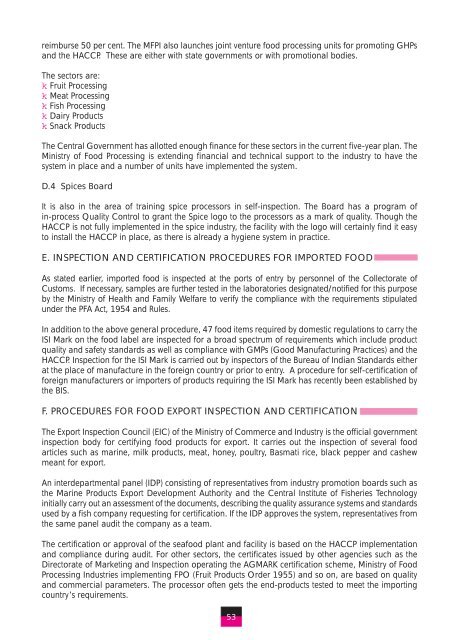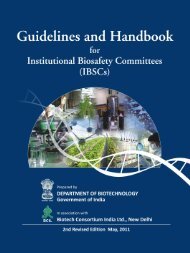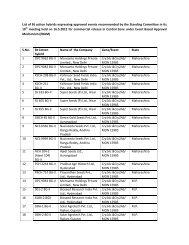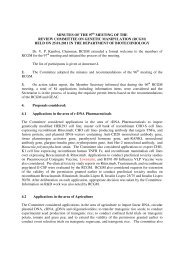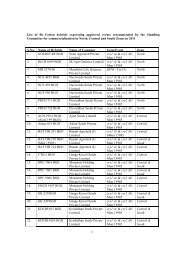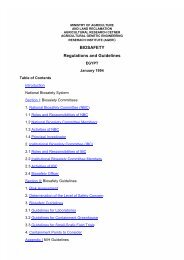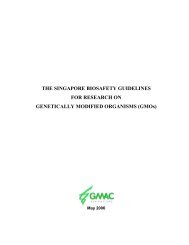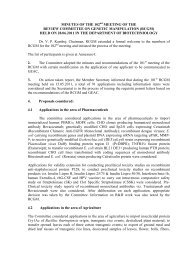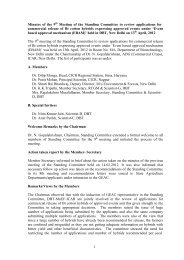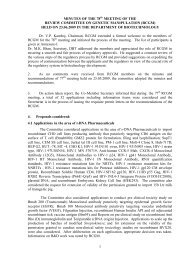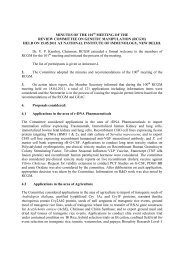THE USER'S MANUAL ON CODEX - Department of Biotechnology
THE USER'S MANUAL ON CODEX - Department of Biotechnology
THE USER'S MANUAL ON CODEX - Department of Biotechnology
Create successful ePaper yourself
Turn your PDF publications into a flip-book with our unique Google optimized e-Paper software.
eimburse 50 per cent. The MFPI also launches joint venture food processing units for promoting GHPs<br />
and the HACCP. These are either with state governments or with promotional bodies.<br />
The sectors are:<br />
k Fruit Processing<br />
k Meat Processing<br />
k Fish Processing<br />
k Dairy Products<br />
k Snack Products<br />
The Central Government has allotted enough finance for these sectors in the current five-year plan. The<br />
Ministry <strong>of</strong> Food Processing is extending financial and technical support to the industry to have the<br />
system in place and a number <strong>of</strong> units have implemented the system.<br />
D.4 Spices Board<br />
It is also in the area <strong>of</strong> training spice processors in self-inspection. The Board has a program <strong>of</strong><br />
in-process Quality Control to grant the Spice logo to the processors as a mark <strong>of</strong> quality. Though the<br />
HACCP is not fully implemented in the spice industry, the facility with the logo will certainly find it easy<br />
to install the HACCP in place, as there is already a hygiene system in practice.<br />
E. INSPECTI<strong>ON</strong> AND CERTIFICATI<strong>ON</strong> PROCEDURES FOR IMPORTED FOOD<br />
As stated earlier, imported food is inspected at the ports <strong>of</strong> entry by personnel <strong>of</strong> the Collectorate <strong>of</strong><br />
Customs. If necessary, samples are further tested in the laboratories designated/notified for this purpose<br />
by the Ministry <strong>of</strong> Health and Family Welfare to verify the compliance with the requirements stipulated<br />
under the PFA Act, 1954 and Rules.<br />
In addition to the above general procedure, 47 food items required by domestic regulations to carry the<br />
ISI Mark on the food label are inspected for a broad spectrum <strong>of</strong> requirements which include product<br />
quality and safety standards as well as compliance with GMPs (Good Manufacturing Practices) and the<br />
HACCP. Inspection for the ISI Mark is carried out by inspectors <strong>of</strong> the Bureau <strong>of</strong> Indian Standards either<br />
at the place <strong>of</strong> manufacture in the foreign country or prior to entry. A procedure for self-certification <strong>of</strong><br />
foreign manufacturers or importers <strong>of</strong> products requiring the ISI Mark has recently been established by<br />
the BIS.<br />
F. PROCEDURES FOR FOOD EXPORT INSPECTI<strong>ON</strong> AND CERTIFICATI<strong>ON</strong><br />
The Export Inspection Council (EIC) <strong>of</strong> the Ministry <strong>of</strong> Commerce and Industry is the <strong>of</strong>ficial government<br />
inspection body for certifying food products for export. It carries out the inspection <strong>of</strong> several food<br />
articles such as marine, milk products, meat, honey, poultry, Basmati rice, black pepper and cashew<br />
meant for export.<br />
An interdepartmental panel (IDP) consisting <strong>of</strong> representatives from industry promotion boards such as<br />
the Marine Products Export Development Authority and the Central Institute <strong>of</strong> Fisheries Technology<br />
initially carry out an assessment <strong>of</strong> the documents, describing the quality assurance systems and standards<br />
used by a fish company requesting for certification. If the IDP approves the system, representatives from<br />
the same panel audit the company as a team.<br />
The certification or approval <strong>of</strong> the seafood plant and facility is based on the HACCP implementation<br />
and compliance during audit. For other sectors, the certificates issued by other agencies such as the<br />
Directorate <strong>of</strong> Marketing and Inspection operating the AGMARK certification scheme, Ministry <strong>of</strong> Food<br />
Processing Industries implementing FPO (Fruit Products Order 1955) and so on, are based on quality<br />
and commercial parameters. The processor <strong>of</strong>ten gets the end-products tested to meet the importing<br />
country’s requirements.<br />
53


